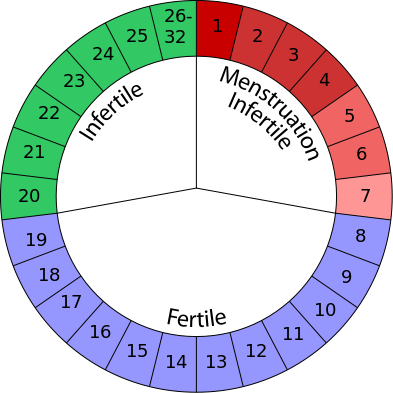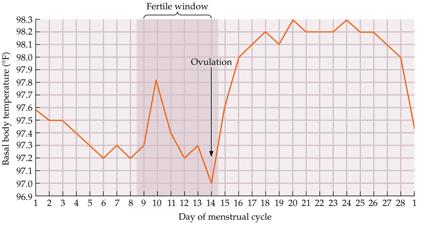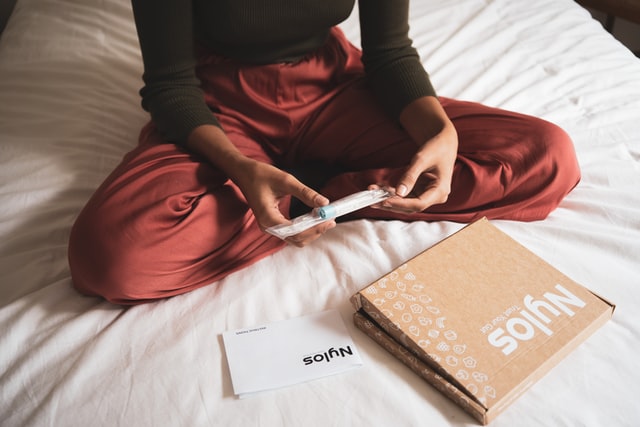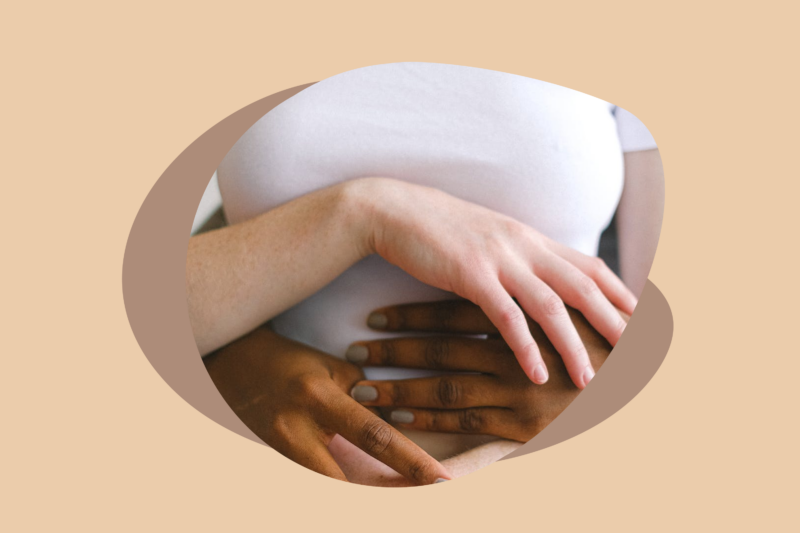It is possible to prevent pregnancy through many ways, both natural and artificial. Natural ways can be of help without taking any medication or using any hormonal manipulation, but they do not guarantee a high success rate as fertile days and ovulation can be hard to estimate.
How to Avoid Pregnancy Naturally
Pregnancy, as one of the most life-changing events in life, should be a well-planned step. If you are not socially, emotionally and physically prepared, then do not take that step and take some measures to avoid unwanted pregnancies.
It is possible to prevent pregnancy through many ways, both natural and artificial. Natural ways can be of help without taking any medication or using any hormonal manipulation, but they do not guarantee a high success rate as fertile days and ovulation can be hard to estimate.
How to Avoid Pregnancy Naturally
Natural ways of avoiding pregnancy include the fertility awareness and the natural family planning method. Under these categories, we have the calendar method, the basal body temperature method, the cervical mucus method, lactational amenorrhea, withdrawal and abstinence. These methods deal with a disciplined and determined mind. Here are some of the guidelines.
1. Follow the Calendar Method
This method requires a close monitoring of the menstrual cycle, particularly the first day of bleeding. It will help prevent pregnancy by determining the fertile days and the infertile days. From the day 1 up to day 7 as well as day 20 till the first day of the next menstrual period, pregnancy rate is very low, but from day 8 through day 19, there is a high risk for pregnancy, since these days are fertile.
However, a woman should keep in mind that this method is advisable only for women with a regular cycle lasting 26 to 32 days. If you have an irregular cycle, then this method might be less effective and other method is recommended.

2. Try the Basal Body Temperature Method
Basal body temperature is a part of fertility awareness method that monitors the lowest body temperature at rest. The theory behind this method is that a woman’s temperature would drop before ovulation and increase once the process ends. Therefore, to avoid pregnancy, women should not have sex when her temperature drops till 2-3 days after the temperature rises again.
But the drop would be very small, usually less than 1 degree F, so it is important to use a special thermometer that is highly accurate and sensitive to track the BBT every morning upon waking up.

3. The Cervical Mucus Method
With the question, how to avoid pregnancy naturally, the cervical mucus method is another perfect choice as this will help determine the fertile days and the infertile days for sex. You can check the cervical mucus by touching the opening of the vagina with the use of a tissue or your two fingers.
- You are fertile when the mucus is slippery, stretchy and clear white; if the cervical mucus is sticky, it means that you just finished your menstrual cycle and you are safe to have sex.
- In addition, if the cervical mucus is sticky and gluey, not stretchable, then you are not yet ready to ovulate and you are not yet fertile. You can safely have sexual activity during this time.
Take note, it’s not proper to check the cervical mucus right after sex. Apart from that, medications like antihistamines, tranquilizers, antibiotics and diuretics can greatly affect the appearance and characteristics of the cervical mucus.
4. Go for Lactational Amenorrhea Method
Aside from the vitamins and minerals that breastfeeding can provide for your baby, an exclusive breastfeeding, can also be an effective contraceptive method 6 months after giving birth, when the menstruation has not yet returned, provided that the mother feeds the baby every 4 hours during the day and every 6 hours during the night.
Careful monitoring is needed for this natural method for the pregnancy to be prevented. The lactational amenorrhea method known to be 98% effective is no longer recommended if the baby is on mixed feeding and if the baby was already 6 months, since any sexual intercourse may already lead to another pregnancy.
Some breastfeeding moms would ask how does breastfeeding stops pregnancy after giving birth and how does it delay menstruation. The hormone responsible for breast milk formation is called prolactin which is also responsible for fertility. With this hormone actively present in the mother’s body, then menstruation will surely be delayed.
5. Try the Withdrawal Method
When asked about how to avoid pregnancy naturally, withdrawal method is another choice. This prevents pregnancy as it hinders the sperm from entering the vagina. In withdrawal method, during a sexual intercourse, right before the ejaculation, the man will withdraw his penis from the vaginal canal, thus preventing any ovulation. The disadvantage of this method is the possibility of pre-ejaculatory sperm that could have entered the vaginal canal even before the penis have been pulled out. Any wrong move may lead to pregnancy.
Studies show that this method is not a 100% guarantee. However, this needs a total agreement and a tough decision between the couple as this involves mind and body coordination.That is the reason why proper knowledge about this specific method is very important.
6. The Need for Abstinence
Another way on how to avoid pregnancy naturally is through abstinence. It means to avoid sex. It can be abstaining from vaginal sex, oral sex or with genital contact. Aside from preventing a woman to bear a child, it also provides protection from sexually transmitted diseases. Without contact, surely pregnancy will be avoided. However, this was a very hard thing to do for most people, especially those who are sexually active.
15 Effective Natural Ways to Avoid Pregnancy At Home!

Are there natural ways to avoid pregnancy at home? Having a baby is a blessing from God and everyone likes to have children at some point in time in their life. But now a day’s people’s lives have changed, and they like to plan on having a baby. In the U.S.A. more than 3.5 million women got pregnant because of unprotected intercourse.
Sometimes protected sex is also not 100% secure and you may get pregnant after all protection measurements. To avoid and prevent pregnancy naturally you can follow 15 ways and natural remedies.
Around 85% of women involved in sexual activity and who don’t use contraceptives can get pregnant within a year. A woman can get pregnant during breastfeeding, menstruation, and even after 10-15 days of delivery. Nowadays women are searching for a natural way to avoid pregnancy because using birth control can have a side effects on your body.
Excessive use of child control pills reduces the chances of getting pregnant in the future. Try natural ways to avoid pregnancy which helps you to understand your body and keep you safe from side effects.
- 1 15 Safe Home Remedies to Avoid Pregnancy
- 1.1 1. Cotton Root Bark
- 1.2 2. Smart Weed Leaves
- 1.3 3. Neem Leaves
- 1.4 4. Parsley (Ajamoda)
- 1.5 5. Dried Fig
- 1.6 6. Rue Herb
- 1.7 7. Blue Cohosh
- 1.8 8. Dried Apricots
- 1.9 9. Angelica
- 1.10 10. Mugwort Herb
- 1.11 11. Pennyroyal
- 1.12 12. Papaya Fruit
- 1.13 13. Queen Anne’s Lace
- 1.14 14. Ginger Root
- 1.15 15. Asafoetida
15 Safe Home Remedies to Avoid Pregnancy
Below we have listed the 15 natural ways to avoid pregnancy that have no side effects on the person.
1. Cotton Root Bark
The cotton root bark is a very effective home remedy to prevent pregnancy. This treatment stimulates a hormone known as oxytocin which is responsible for childbirth.
- Take 3-4 small cotton root pieces and add to tea or in a cup of hot water.
- Let it steep for a few minutes and then drink.
- You can take this remedy twice a day.
2. Smart Weed Leaves
Smartweed leaves are simply one of the most effective remedies to stop unwanted pregnancy. This natural remedy is blessed with a component like gallic acid, quercetin acid, and rutin.
- Take four ounces of fresh weed leaves and boil them in four cups of water.
- Let it simmer for 5-10 minutes then strain it.
- Drink this natural remedy until you get your menstrual cycle.
- This remedy also helps you to get your period on time.
3. Neem Leaves
It may surprise you, but neem is an excellent remedy for birth control. Neem can work as natural contraception and help you avoid pregnancy. It helps to decrease sperm motility and even kills them.
- You can consume fresh neem leaves daily, or neem oil is also available in the market.
- Men can take neem tablets to promote sterility.
4. Parsley (Ajamoda)
Parsley is one of the safe ayurvedic herbs to prevent unwanted pregnancy. It also helps to regulate your menstrual cycle. This natural herb has no side effects, and you consume it as herbal tea.
- Boil one teaspoon of parsley fresh or dried leaves in a cup of boiling water.
- Strain this mixture and drink it regularly to avoid pregnancy.
5. Dried Fig
Dried figs are a very useful home remedy for childbirth control and help to get rid of unwanted pregnancies. This remedy also helps in increasing the blood circulation of the body.
- Eat dried figs after having sex and take this remedy on until you get your period.
6. Rue Herb
Rue is one of the most suggested natural herbs to prevent pregnancy without a condom. Take this remedy within 15 days after intercourse.
- Take two tablespoons of rue and boil in a cup of water for 5 minutes.
- Let it steep then strain this mixture.
- Drink this remedy within 15 days of sexual activity.
7. Blue Cohosh
Another excellent remedy to stop pregnancy naturally at home.
- You can prepare tea from blue cohosh and drink it twice a day.
- This remedy should be used at the limit, and we advise you to take your physicist’s advice before taking this natural herb.
8. Dried Apricots
This remedy is useful when your pregnancy test is negative. Once your pregnancy test is positive, you should not consume dried apricots.
- Take one teaspoon of honey and water, and mix with 100 gm of dried apricots.
- Boil this natural herb in a cup of water until the amount of water reduces to half of the cup.
- Then drink this remedy once a day.
- This remedy is an excellent way to prevent pregnancy and also cure excessive bleeding due to the menstrual cycle.
9. Angelica
Angelica is a perfect and famous natural remedy for childbirth control. Dong Quai is another name for this natural remedy. This natural herb encourages uterine contractions.
- Take this natural herb within 15 days of sexual intercourse to avoid pregnancy.
10. Mugwort Herb
Mugwort is also known as Indian wormwood which looks like parsley.
- Take one teaspoon of dried mugwort with water after intercourse until you get a period.
- You can also check with your doctor about its dosage because it can cause renal failure.
- Try to avoid this remedy if you have kidney disease.
11. Pennyroyal
This is one of the oldest natural herbs to avoid unwanted pregnancy.
- Take a small piece of dried pennyroyal and add it to your tea. Drink this tea once a day.
- Try to use this remedy in an emergency as this remedy could have some side effects.
- Consult with your doctor first for dosage.
12. Papaya Fruit
Papaya is another way to avoid pregnancy and it also helps you to prevent abortion.
- Eat papaya just after having sexual intercourse for 2-3 days. If your pregnancy test is positive, you can stop eating papaya.
13. Queen Anne’s Lace
This natural herb is also known as wild carrot seeds. Queen Anne’s lace is a very old and famous natural remedy to stop pregnancy.
- Take one teaspoon of seeds and soak them in water. Have this remedy once in a day with water.
- We recommend you drink a lot of water while taking this remedy.
- Chewing this remedy also helps in preventing pregnancy.
14. Ginger Root
You will be surprised to know that ginger can also help in avoiding pregnancy.
- Boil grated ginger in water for 5 minutes and let it steep for 5 minutes.
- Strain this mixture and drink twice a day after intercourse until you get a period.
15. Asafoetida
It is an Iranian-origin natural remedy that smells pungent.
- Extract fresh asafetida juice and drink it every month with water to avoid pregnancy and abortion.
Natural Ways To Avoid Pregnancy – Tips of Contraception
There are other methods that you can perform before, after, and during sexual intercourse. Techniques for avoiding pregnancy or natural family planning depend on a woman’s body and period cycle. No method and tips can give you 100% success every time. We try to summarize a few techniques and tips below.
- Calendar Method to Avoid Pregnancy: Make a note of your menstrual cycle based on your last 12 menstrual cycles. You should subtract 18 days from your shortest period cycle and know your first fertile day, and 11 days from your longer period cycle to know your last fertile day. If you have an irregular menstrual cycle, your chance of getting pregnant increases because you will have more days to be fertile.
- Body Temperature Method to Stop Pregnancy: This method is based on your body temperature. Women body tends to drop her body temperature 12 to 20 hours before releasing an egg and once the egg is released body temperature rises again. So you should keep track of your body temperatures because the change in your body temperatures is minimal 1 or 2 degree Celsius. Note your body temperature every day in the morning when you come out of bed. Calculate with a sensitive thermometer because of accuracy in temperature.
- Symptothermal method to Prevent Pregnancy: This technique includes the above two methods and other symptoms of your body. If you are feeling cramping, breast tenderness, and abdominal discomfort when you release the egg. Then you should avoid sexual intercourse during this period because your egg is being released which increases your chances of getting married.
Closing Thoughts
Being pregnant is very special for every woman because becoming a mother is something very pure and complete enjoyment. But sometimes there are times when you are not ready for pregnancy. No worries! We have listed the 15 safe home remedies to avoid pregnancy that have no side effects. Hope this article has provided some knowledge on how to avoid pregnancy.
You can also check:
- White Discharge During Pregnancy: Normal?
- How to Treat Heartburn in Pregnancy
- How to Increase Breast Size Naturally
- Homemade Pregnancy Test
- TAGS
- how to avoid pregnancy
- how to avoid pregnancy naturally
- how to prevent pregnancy
- natural birth control
- natural contraception
- natural family planning methods
- Natural ways to prevent pregnancy
How to Not Get Pregnant: 13 Ways to Avoid Pregnancy

Pop “how to not get pregnant” into any search bar and you’re sure to find a range of advice – some good, some not so good. The truth of the matter is that abstinence is the only way to really avoid pregnancy since this ensures the sperm and egg will never meet. But if practicing abstinence isn’t a realistic option, there are other methods you can use to avoid pregnancy.
A person risks pregnancy every time they have unprotected sex and being aware of your options and learning how each one works is a key factor to not only avoid pregnancy, but take control of your health and fertility. In this post we’ll take a look at 13 different ways to avoid pregnancy and methods you can use to help you.
Is it hard to avoid pregnancy if you’re sexually active?
According to the American Pregnancy Association, a healthy young woman having frequent sex only has a 20% chance of pregnancy each month with regular intercourse. There is a relatively short window during a woman’s menstrual cycle that is ideal for conceiving so whether a woman is on birth control or not, the conditions for conception are not usually ideal.
And while no day is completely safe when it comes to NOT getting pregnant, tracking your cycle and knowing your fertile signs can help you make decisions to make your chances extremely low. If you are trying to avoid pregnancy while still being sexually active, there are many tools available to prevent pregnancy.
How to not get pregnant
Whether you choose to use a contraceptive method or monitor your body for fertility signs, there are many options to consider when it comes to avoiding pregnancy.
Contraception
From hormonal to barrier methods, there are a number of contraceptive options to choose from when it comes to birth control. Ultimately your decision will come down to safety, availability, affordability, and even acceptability as well as what works best for you and should ideally be discussed with your doctor.
Male condoms
Male condoms are thin, stretchy pouches worn on the penis during sex and provide barrier protection from pregnancy by stopping sperm from getting into the vagina. They work by collecting the semen before it enters the vagina so it has no chance of meeting up with the egg. Condoms come in latex, non-latex, and animal skin varieties and some even help prevent STIs. With proper use, condoms are 98% effective at preventing pregnancy but work best when used correctly.
Female condoms
Female condoms, also called “internal condoms” are similar to male condoms in that they are a form of barrier protection against pregnancy. But unlike male condoms, they don’t go over the penis and are a pouch worn inside the vagina to prevent sperm from entering and meeting an egg.
Like male condoms, they also provide some protection against STIs and because they cover the inside of your vagina and some parts of your vulva, they also decrease your chance of coming into contact with pre-cum (which can lead to pregnancy). Although they were originally called “female” condoms, they are now more commonly referred to as “internal” condoms as people of any gender can use them for vaginal sex.
IUDs
An IUD or Intrauterine Device is a tiny device inserted into your uterus to prevent pregnancy and is one of the most effective birth control methods. Some IUDs are copper, but most are hormonal, meaning they use a hormone to prevent pregnancy. The hormone progestin, similar to the progesterone we make naturally, prevents pregnancy by thickening cervical mucus and even stopping ovulation. Copper IUDs work by preventing sperm from getting to the egg due to the copper material.
IUDs provide effective birth control for many years (depending on which kind you get) but aren’t permanent. Your fertility bounces back right away after removal and there are no long lasting effects on your fertility. They can even be used as emergency contraception as they are more than 99% effective if put in within 120 hours after unprotected sex.
Birth control
Most people are familiar with the birth control pill, but hormonal birth control also includes skin patches, vaginal rings, shots, and implants. They prevent pregnancy by using hormones similar to the ones already in your body to stop the release of an egg. No egg released means sperm never has a chance to meet and fertilize it and therefore no pregnancy takes place. Although birth control is good at preventing pregnancy, it offers no protection against STDs and must be used correctly to offer the best protection.
Emergency contraception (morning after pill)
Although certain IUDs offer emergency contraception and are the most effective, most people are familiar with emergency contraception in the form of the morning after pill. If taken within 72 hours (3 days) after unprotected sex, emergency contraception makes it much less likely that you will get pregnant.
Because you only have a limited amount of time to try and prevent pregnancy after unprotected sex, many people keep the morning after pill at home to use as soon as possible if needed. Morning after pills work by releasing hormones to temporarily stop ovulation and the timing is incredibly important. Success depends on where you are in your cycle and when you took the pill: if your body has already started ovulating, most pills won’t work
It’s important to note that emergency contraception prevents a pregnancy from happening and does not cause an abortion. It won’t harm an existing pregnancy, but it won’t work if you are already pregnant as emergency contraception is a form of birth control and not an abortion.
Sterilization
Sterilization is a type of surgical procedure that permanently prevents pregnancy. The type of sterilization depends on the procedure being performed. In a tubal ligation, the fallopian tubes are permanently closed, cut, or removed whereas a bilateral salpingectomy removes the fallopian tubes entirely. Sterilization removes the possibility of pregnancy from ever occurring because the sperm can’t get to the egg and fertilize it. This procedure is commonly referred to as having your “tubes tied” regardless of which type of procedure you undergo.
Abstinence
Abstinence is technically defined as not having sex, but can mean different things to different people. As a form of birth control, it helps avoid pregnancy by preventing semen from reaching the egg for fertilization. For some people, abstinence means a complete lack of sexual activity, while for others it means not having vaginal sex.
Spermicidal lubricant
With this type of birth control, a gel is inserted into the vagina to stop the sperm from reaching an egg. The gel or substance contains chemicals that impairs sperm movement so it can’t swim to the egg. Despite the name, spermicide doesn’t actually kill sperm, it simply slows it down so it can’t reach the egg. Inserted deep into the vagina, spermicidal lubricant may come in cream, gel, film or foam format. There are even some that are suppositories that melt into a cream inside your vagina.
Monitoring your body
Also known as fertility awareness, monitoring your body is a form of natural conception that helps you estimate when your fertile window is so you can avoid sex when you’re most likely to get pregnant. When used consistently and correctly, fertility awareness is almost 90% effective at preventing pregnancy.
If you are using fertility awareness methods (FAMs) to avoid pregnancy then you need to be well-informed about FAMs and your cycle. Whether you choose to use the basal body temperature method, cervical mucus method, the calendar method, or the standard days method you’ll need to pay close attention to the signs of fertility as your body responds to changes in your hormone levels throughout your menstrual cycle.
Hormone tracking
Regardless of when you ovulate, your sex hormones follow a predictable path before ovulation. Estrogen usually rises in the three to five days leading to ovulation. Luteinizing hormone (LH) also surges 24 to 36 hours before ovulation, peaking 10 to 12 hours prior to ovulation. The changes in these two hormones cause ovulation and together are one of the most accurate and fundamental signs of ovulation.
Traditionally, hormone tracking would be an expensive and medically monitored procedure unavailable to most women. However, with the rise of home health technology there are now devices and tests available for personalized hormone tracking. Devices like Mira’s digital fertility analyzer help you track hormone concentrations in order to precisely determine your fertile window and when you can safely have sex to either avoid, or plan a pregnancy.
Basal Body Temperature Method
BBT is a natural method of contraception that involves you measuring your body’s resting temperature, or basal body temperature, every morning before getting out of bed. Based on temperature readings (there is a slight rise in BBT after ovulation), women can predict when they are most fertile.
This method relies on accuracy, consistency, and timing and you’ll need a special thermometer to do it correctly. Consistency in taking your BBT requires at least 3 cycles to track your basal body temperature in order to learn your body’s baseline temperature.
Cervical Mucus Method
This method involves monitoring changes in cervical mucus to predict fertile days. Normal cervical mucus is thick, creamy and off-white or yellowish in color. However, around ovulation, it becomes stretchy, clear, and slippery like an egg white. By monitoring the change in consistency, you begin to understand the patterns of your cervical mucus throughout your cycle and predict your fertile days based on this information.
Like BBT, the cervical mucus method of natural contraception requires consistency and time. You’ll need to check your cervix every day and it may take several cycles while you get to know your body’s natural rhythm and discharge characteristics.
Calendar/Calculator Method
Following a basic formula, the Calendar or Calculator Method of natural contraception uses a calendar or cycle calculator to determine your fertile days. By calculating your typical cycle length and tracking the first day of your last period, it is a quick and easy way to determine when you are most fertile.
However, this method has its challenges as it’s based on standard cycle lengths that may not accurately reflect your own (or an irregular) cycle. It has a large margin for error and may not be the most reliable method if you are actively trying to avoid pregnancy.
The Standard Days Method
Another calendar-based natural contraception is the Standard Days Method. Stricter than the Calendar/Calculator method, this process uses a fixed window in a woman’s menstrual cycle to determine which days are safe for unprotected sex.
In this method, days 8 through 19 (for cycles 26-32 days in length) are used as the fixed window to avoid sex if you do not want to get pregnant. The wide window accounts for variations in ovulation between women and between cycles. There is no real tracking required with this method but, as you can imagine, it is not the most reliable method of contraception especially for those with abnormal cycles, underlying hormonal conditions, or women who are breastfeeding.
Tips for avoiding pregnancy
Use more than one method
To improve your chances of avoidance, consider using multiple methods. It is entirely possible to avoid (or plan) conception on your own, but using more than 1 method will help ensure accuracy and improve your chances of success.
It’s important to note that abstinence is the only true method of avoiding pregnancy, though it’s not always realistic or practical. It’s useful to explore your contraceptive options, such as barrier methods or hormonal birth control, and make sure you are using them correctly when it comes to how to have sex without getting pregnant.
Abstain from sex during your fertile window
In order to effectively postpone pregnancy naturally, a woman must be able to detect the beginning and end of her fertile window. Avoiding sex on the days you are most fertile, or during your fertile window, is key to preventing or postponing pregnancy. Even though you are not equally likely to conceive on every day of your fertile window, your chance of conception is still high. If you are trying to avoid pregnancy you will need to avoid sex during this time.
Avoid unprotected sex
One of the easiest ways to avoid pregnancy is to avoid unprotected sex. The bottom line is that even a single act of unprotected intercourse can result in pregnancy and if you are serious about avoiding pregnancy then your best bet (after abstinence) is to avoid unprotected sex.
FAQs about avoiding pregnancy
When are you most fertile?
You are most fertile during your fertile window. This time frame includes the days leading up to ovulation and the day of ovulation. On average, the fertile window lasts for six days and occurs around mid-cycle.
When are you least fertile?
Your least fertile days are during your actual period or the menstruation phase of your menstrual cycle. According to the Human Reproduction Journal, your chances are lowest on Day 4 of your menstrual cycle.
How likely is it to get pregnant without trying?
The time it takes for a person to get pregnant varies significantly and depends on many factors. There are many lifestyle factors that can impact your fertility and affect how likely it is for you to get pregnant without trying. Doctors typically recommend women under 35 actively try for a year (6 months if you’re over 35) before investigating further issues.
About Banafsheh Kashani

Banafsheh Kashani, M.D., FACOG is a board-certified OB/GYN and specialist in reproductive endocrinology and infertility at Eden Fertility Centers and has been treating couples and individuals with infertility since 2014.
Dr. Kashani has conducted extensive research in female reproduction, with a specific focus on the endometrium and implantation. Additionally, Dr. Kashani has authored papers in the areas of fertility preservation, and fertility in women with PCOS and Turners syndrome.
Trending Topics
Free TTC Book


Order Your Mira Today
Ready to easily, precisely, and automatically track your ovulation cycles? Let Mira take the guesswork out of getting pregnant, so you know exactly when to conceive.
Recent Articles

How Can I Increase my Chances of Getting Pregnant?
To help you maintain that special spark with your partner while trying to conceive, here’s an overview of how the TTC journey may affect your relationship and what you can do to protect it.

Keeping Love Alive When Trying to Conceive
To help you maintain that special spark with your partner while trying to conceive, here’s an overview of how the TTC journey may affect your relationship and what you can do to protect it.

Becoming a Single Parent by Choice. How to Conceive on Your Own.
If you’re actively trying to get pregnant, no worry: you don’t need alcohol to enjoy the festive season so here are five non-alcoholic drink options to get you into the holiday spirit.






